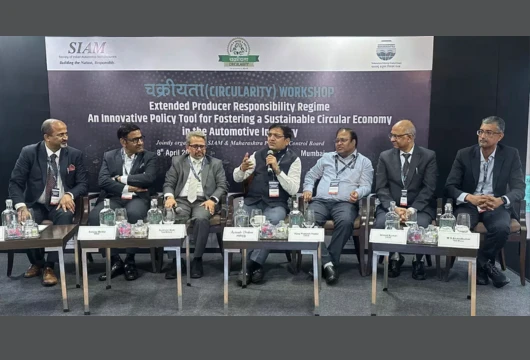Union Minister Bhupender Yadav Champions Circular Economy in the Auto Sector
The Indian automotive industry is at a turning point, with a growing emphasis on sustainability, circularity, and waste reduction. At the 3rd International Conference on Sustainable Circularity, organized by the Society of Indian Automobile Manufacturers (SIAM), Union Minister for Environment, Forest, and Climate Change, Shri Bhupender Yadav, delivered an inspiring keynote address. Themed “Nature Positive Recycling,” the event gathered key stakeholders from the industry to discuss the future of circular economy practices in India’s booming automotive sector.
Addressing the conference in New Delhi on January 20, 2025, Shri Yadav underscored the automobile industry’s dual responsibility to drive economic growth while ensuring environmental sustainability. He emphasized that the circular economy is not just an option but an imperative for India’s future, urging manufacturers to learn from Nature’sNature’s efficient recycling systems.
India Accelerates Circular Economy in Automobiles
“Nobody Recycles Like Nature”: Lessons for the Auto Sector
In his speech, Shri Yadav highlighted nature’sNature’s unparalleled efficiency in recycling, stating:
“Nobody recycles like Nature. We can never match the scale of production when it comes to Nature, yet there is zero waste. As we take pride in our manufacturing abilities, let us also take a humbling lesson from Mother Nature in managing waste.”
He called upon automakers and industry leaders to adopt nature-inspired recycling strategies when designing vehicles and production systems. The transition to a circular economy, he explained, brings three key benefits:
- Economic Growth: Reducing dependency on raw materials, lowering costs.
- Environmental Sustainability: Cutting emissions and minimizing resource depletion.
- Social Impact: Creating green jobs and promoting sustainable practices.
Government Policies Driving Circularity in the Auto Industry
Shri Yadav applauded Prime Minister Narendra Modi’s leadership, highlighting how India is moving beyond waste management to unlocking the value of waste—turning “Waste to Wealth.” He detailed key policies that are shaping the country’s sustainable automotive ecosystem:
1. Vehicle Scrappage Policy (2021)
- Encourages the phased removal of older, polluting vehicles.
- Mandates fitness tests for passenger vehicles over 20 years and commercial vehicles over 15 years.
- Expected to cut NOx emissions by 17% and PM2.5 emissions by 11% from freight trucks.
2. End-of-Life Vehicles (ELVs) Rules, 2025
- Effective April 1, 2025, ensuring eco-friendly vehicle scrapping.
- Introduces Extended Producer Responsibility (EPR), making manufacturers accountable for sustainable disposal.
- Offers incentives for responsible vehicle scrapping, promoting green dismantling practices.
3. Promotion of Electric Vehicles (EVs)
- Faster Adoption and Manufacturing of Electric Vehicles (FAME) scheme boosting EV production.
- Production-Linked Incentive (PLI) scheme supporting domestic EV manufacturing.
- EVs are expected to make up 35% of total vehicle sales by 2030, reducing five metric tonnes of CO2 emissions annually.
Achieving Sustainable Development Goals (SDGs) Through Circularity
The Minister stressed that circular economy principles align with multiple UN Sustainable Development Goals (SDGs):
- SDG 7 (Affordable & Clean Energy): Driving the shift towards renewable energy-powered EVs.
- SDG 8 (Decent Work & Economic Growth): Generating green jobs in recycling and sustainable manufacturing.
- SDG 9 (Industry, Innovation & Infrastructure): Encouraging eco-friendly auto industry innovations.
He emphasized that India must adopt renewable energy solutions for EV charging infrastructure to realize electrification’s environmental benefits.
SIAM’s Call for Industry Leadership in Circularity
Shri Yadav urged SIAM and automotive manufacturers to lead India’s transition to a circular economy by:
- Incorporating recyclable designs to ensure vehicles have a minimal environmental footprint.
- Promoting sustainability in dealerships by integrating green supply chains.
- Enhancing consumer awareness about vehicle recycling, disposal, and responsible ownership.
To reinforce this commitment, he unveiled the SIAM Strategy Paper, “Towards Circular Future in the Automobile Industry: Integrating EPR Regime in Waste Stream Regulation.”
This strategic document provides a roadmap for automobile manufacturers to align with global sustainability standards while fostering economic growth.
Green Mobility & Afforestation: A Holistic Approach
The Minister also encouraged participation in afforestation initiatives like ‘Ek Ped Ma Ke Naam,’ emphasizing the interconnectedness of air pollution, deforestation, and sustainable mobility. He urged automakers to engage in CSR activities focused on reforestation, reinforcing the link between a cleaner environment and a robust transportation ecosystem.
Why Afforestation Matters:
- Absorbs vehicular emissions, reducing urban air pollution.
- Enhances biodiversity, fostering ecological balance.
- Supports India’s climate resilience goals.
The Future of India’s Circular Automotive Economy
With India’s automotive industry now ranking as the third-largest globally, the shift toward sustainable circularity is critical. The government and industry must work together to:
- Scale up vehicle scrappage and recycling infrastructure.
- Strengthen regulatory frameworks for circular manufacturing.
- Promote next-gen mobility solutions, including hydrogen fuel and EV innovations.
- Expand global collaborations on sustainable automotive practices.
The Minister reaffirmed that economic growth and environmental responsibility must go hand in hand. He emphasized that India is not just adopting global sustainability trends but actively shaping the future of green mobility.
Paving the Way for a Circular Auto Industry
The 3rd SIAM International Conference on Sustainable Circularity reinforced a clear vision—India’s automotive industry must transition to a circular economy to remain globally competitive and environmentally responsible.
With strong government policies, industry innovation, and public participation, the country is on track to becoming a leader in sustainable mobility. As Shri Yadav stated, nature’sNature’s recycling efficiency should inspire the auto sector to build a waste-free, green future.
For more in-depth analysis and inspiring cl

